Billy Coffey's Blog, page 21
April 24, 2014
Celebrating Earth Day
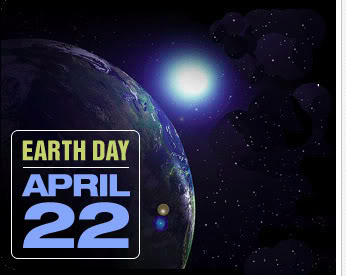
image courtesy of photo bucket.com
Tuesday morning:“We are earth!” she says.
I’m standing in the local Starbucks, getting the stink-eye from the cashier. She doesn’t like me, this woman. She told me so. “I can’t stand people like you,” she had mumbled under her breath a few moments before.
“Please?” I try once more, looking at my cup. “You mean you don’t have any?”
“I’m trying to save the planet here, sir,” she answers. “We’re all in the circle of life. What happens to the earth happens to us, you know.”
Circle of life? I think. What is this, The Lion King?
“I thought you were just making me some coffee.”
“Well, I did,” she answers, scooting the cup toward me.
I’m beaten. I know this. Knew it the first time I asked her. And I deserved it, too. This is what I get for driving to Starbucks for a four dollar cup of coffee when I could have just made my own at home. But some days are just made for a venti caramel macchiato, regardless of the consequences.
My mistake was going out the door ignorant of the fact that it was Earth Day. Had I realized that, I would have definitely stayed at home. Because Earth Day is when many of the normally sane people you meet during the day turn crazy. Much like the lady behind the register at Starbucks.
And this whole thing began well enough. She smiled asked what I’d like, and I’d smiled and gave her my order. She smiled and made my coffee, and I smiled and said thank you.
But then I couldn’t find a sleeve to put over my cup.
“Excuse me,” I said. “You wouldn’t happen to have any sleeves laying around back there, would you?”
“We’re requesting our customers not use sleeves,” she said. “Since it’s Earth Day and all.”
I failed to make the connection. “Why?” I asked.
“Because it’s better for the Earth.”
“It’s better for the Earth if I drink my coffee without a sleeve?”
“We’re trying to reduce our carbon footprint, sir. I’m sure you understand.”
“Sure,” I answered. “Absolutely.”
But then I tried picking up my coffee, which she had brewed to a temperature of about five thousand degrees. No way could I make it back to my truck without the plastic cup melting to my fingers.
So. It was either find a sleeve or stand there and wait for it to cool down.
“Ma’am,” I said. “You sure you don’t have a sleeve around here? This is pretty hot.”
“Sir, we’re really asking that you try and make due. It’s a little sacrifice to make for what we’ve done to our planet. I mean, let’s face it. The world would be better off without us around polluting it. A lot of our customers are bringing their own sleeves now.”
So now I have to bring my own sleeves to Starbucks? I already have to bring my own bags to the grocery store. Keep this up, and I’ll have to buy an even bigger SUV to haul everything around. What’ll they say then?
With little options available, I waited.
“Happy Earth Day, by the way,” she said, wiping down the counter in front of me. “I love Earth Day. It’s so…spiritual.”
“It is?” I asked her.
“Sure. You don’t think so?”
I tried picking up the cup again, then let go when I heard the sizzle on my fingers. “I guess it’s good. Important, maybe. But not spiritual.”
“But we’re all made to be spiritual creatures.”
“Yes.”
“Then you should feel a spiritual connection with Earth.”
“Why?”
At which point came the “We are Earth” comment.
So here we are, her and I, together yet separated. And by more than a simple counter. By the way we see our world.
I agree with her in this way: we are all made to be spiritual creatures. Whether we choose to believe so or not. But her thoughts ended there. Mine went further.
More than merely spiritual, we are special. Part earth, yes. Also part divine. Blessed with a spark of God that we may either kindle into a burning inferno or a tiny ember. Put here so that we may know and love Him, that we may know and love others, and that we may be good stewards of his world.
I love Earth. Love its mountains and its seas. Love clean air and clear water. I reduce and reuse and recycle. Not to show my love for Mother Nature. To show my love for Father God.
This lady in front of me is wrong. We’re not a little lower than the earth.
We’re a little lower than the angels.
I touch my cup one more time. No sizzle.
“You’re right,” I tell her as I leave. “We are Earth. But we are also so much more.”

April 21, 2014
A question of prayer

image courtesy of photo bucket.com
Working at a college has its advantages. Having access to such a big group of smart people comes in handy for me in my daily life, especially when it comes to some of the larger problems I run across. In the five years I’ve been there, I have spoken with English professors about writing, political science professors about the goings-on in the world, and religion and philosophy professors about, well, religion and philosophy.I would call none of our conversations a sharing of ideas. Their words and the diplomas that hang on their office walls are proof enough they are much more intelligent than little ol’ me. I’m good with that. There are advantages to being the dumb person in the room.
So the other day when my mind asked a question my heart had trouble answering, I went knocking on some office doors.
The first chair I sat in was in front of four bookcases that stretched floor to ceiling and were stuffed with titles I could barely pronounce. The professor—smart fella, with a Ph.D. in philosophy courtesy of an Ivy League school—looked at me with kind eyes and asked what was on my mind.
“What’s the point of praying for anything?” I asked him. “I mean, if God knows everything and has a perfect plan, then won’t His plan work out regardless of what I tell Him?”
The professor took off his glasses, rubbed the lenses with a handkerchief. Then he put the glasses back on and looked at the bookshelves behind me, looking for an answer.
“Let’s see,” he told me. He rose from the chair by the desk and brought down one book—this one old, with a worn leather cover and yellowed pages—and then another, this one so new the spine cracked as he opened it.
He talked for ten minutes about free will and time being an unfinished sentence. Or something. My nods at first were of the understanding kind. The ones toward the end were because I was fighting sleep.
I still don’t know what he said.
The door down the hall belonged to a religion professor (Ph.D. again, Ivy League again). I sat in a different chair in front of different books and asked the same question with the same results. More free will, plus something about alternate histories and God “delighting in Himself.”
It wasn’t the first time I’d walked into a professor’s office with one question and walked out with a dozen.
To make matters worse, my mind was still asking that question and my heart was still having trouble answering it.
What’s the point of praying for anything? Because it seems a little presumptuous to ask for anything from a God who already knows what I need (and what I don’t).
I was at a standstill over all of this until I talked to Ralph at the Dairy Queen last night. Ralph doesn’t have a Ph.D., and the only Ivy he knows is the kind that grows on the side of his house. And though far from an expert on matters of the spirit, he does preach part-time at one of the local churches when the regular preacher is sick or on vacation. And since he waved at me and was eating his cheeseburger all alone, I figured what the heck. I’d ask him:
“What’s the point of praying for anything?”
Ralph paused mid-chew. Cocked his head a little to the side. Said, “What kinda stupid question is that?”
“I don’t know,” I said. “Just popped into my head the other day. But seriously, why ask Him for anything. And really, why pray at all? If God already knows what’s in my heart, why do I have to speak it?”
Ralph finished his bite, swallowed, then said, “B’cause it ain’t about you, son.”
“It’s not?”
He drawled out a slow “No” that sounded more like Nooo. “Boy, prayin’ ain’t about askin’. Ain’t even about praisin’, really. Nope, prayin’s about you gettin’ in line with God. It’s not about Him gettin’ in your head and heart, it’s about you gettin’ in His.”
Ah.
I left Ralph to his cheeseburger, answers in hand. And honestly, that answer made sense. Because life—better life, anyway—is always about Him more than about us.
And I left with other wisdom, too. The next time I have a question, I think I’ll spend less time in a professor’s office and more time down at the Dairy Queen.

April 14, 2014
The value of our art
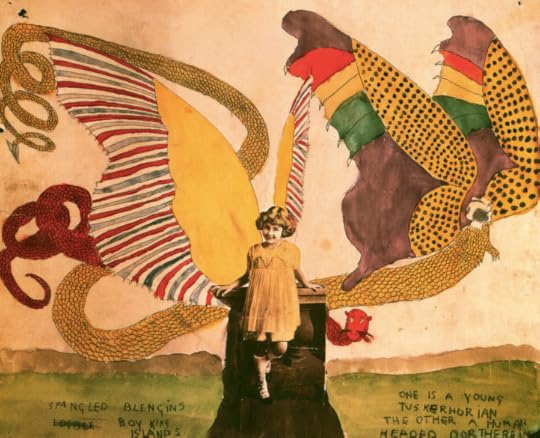
image courtesy of google images. Spangled Blengins, Boy King Islands. One is a young Tuskorhorian, the other a human headed Dortherean by Henry Darger
Let me tell you about Henry Darger, the man who wrote one of the most detailed and bizarre books in history.
Never heard of him? Me neither. At least, not until I happened to stumble upon his story a few weeks ago. Seems strange that someone who did something so grand could be so unknown, doesn’t it? But it’s true. In fact, you could even say that’s why Henry was so extraordinary.
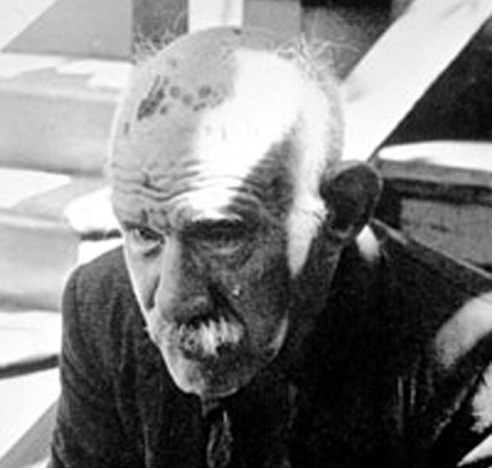
image courtesy of google images
He was a janitor. Nothing so special about that, but nothing so wrong with it, either. There is no correlation between who a person is and what that person does for a living. Einstein was a patent clerk. Faulkner a mailman. Henry Darger mopped floors.
An unassuming man. A quiet man. He never married, never really had friends. Just a regular guy living a regular life, one of the faceless masses that occupy so much of the world who are here for a short while and then gone forever.
Henry left in 1973.
There are no accounts of his funeral. I don’t know if anyone attended at all, though I like to think they did. I like to think there was a crowd huddled around his casket that day to bid him farewell.
It is an unfortunate fact of life that so many people are discovered to have been truly extraordinary only after their passing. Such was the case with Henry. A few days after his passing, his landlord went through his apartment to ready it for rent. What he found was astonishing.
What he found hidden among Henry’s possessions was a manuscript. Its title may give you a clue as to the story’s scope and magnitude:
THE STORY OF THE VIVIAN GIRLS, IN WHAT IS KNOWN AS THE REALMS OF THE UNREAL, OF THE GLANDECO-ANGELINIAN WAR STORM, CAUSED BY THE CHILD SLAVE REBELLION
Did you get that? If not, I can’t blame you. I had to read the title three times to even understand a little of it, and that doesn’t count the time I actually wrote it out.
The breadth and scope of Henry’s book went well beyond epic. The manuscript itself contained 15,000 pages. Over nine million words. Over 300 watercolor pictures coinciding with the story. Some of the illustrations were so large they measured ten feet wide.
A lifetime’s worth of work. Years upon years of solitary effort, hundreds of thousands of hours spent writing and painting, creating an entire saga of another world.
And all for no apparent reason. Not only did Henry Darger never seek any sort of publication for his work, he never told a soul about it. His book was his dream and his secret alone.
I’ve thought about Henry Darger a lot since I first read about him. Which, as change or fate would have it, just to happened to be the very week my newest novel released. A tough thing, that. You’d think it wouldn’t be, perhaps, but it is. No matter who an author is or how successful he or she may be or how many books or under his or her belt, the most important thing to us all is that our words matter. Matter to others, matter to the world. We want what we say and think and feel to count for something.
But Henry Darger reminds me that none of those things mean anything. In the end, we cannot account for how the world will judge our work, and so, in the end, the world’s opinion really doesn’t matter. Simple as that.
What matters—what counts—is that our words stir not the world, but ourselves. That they conjure in our own hearts and minds a kind of magic that neither the years nor the work can dull. The kind of magic that sustains us in our lonely times and gives our own private worlds meaning. The kind of magic that tinges even the life of a simple janitor with greatness.

April 10, 2014
Cheating the seasons

image courtesy of photobucket.com
Three weeks ago…I’m standing on my front porch in the early a.m., as is my habit before starting the day. A cup of coffee and a view of the neighborhood serves as my morning news, and it’s all the news I need. The mountains and the creek are right where I left them last night. I need that assurance. It reminds me that even if the world’s a mess, the mountains and the creek are still here and so am I.
My eyes wander to the flower beds below me, and then to the green something poking up from the mulch and dirt. To me, flowers have always been like people I meet once and then again months later—I can place what they look like but can’t seem to remember their names. So ask if me if we have roses and daisies and begonias, and I’ll answer no. I will say, however, that we have red flowers and white flowers and pink flowers.
But these green things shooting up from the earth? These I know.
Tulips.
The tulips are the first spring flowers to sprout around here. Which to me makes them much more than just a plant, but a vital part of nature’s calendar. When you begin to see tulips, you know better times are at hand. No more cold, no more snow, no more gray skies and bare trees. Everything is about to be make new again.
Seeing that first tulip means I’ve made it. That I’ve survived one more long and dreary winter.
That’s how it usually is, anyway. But as I stand there staring down at this first true sign of spring, all the joy and peace I know I should be feeling isn’t there.
Because I’ve cheated, you see. These aren’t the first tulips I’ve seen this year.
The local nursery is owned by relatives of mine, Mennonites with green thumbs. They can grow anything. And thanks to the modern marvels of both science and climate controlled greenhouses, they can grow anything at any time. Even in the middle of the worst winter I could remember.
So in the middle of January and our third consecutive snowstorm, I stopped one day to say hello and buy some tulips. Things were getting pretty blah at that point, and so was I. I was tired of having to endure and scrape by. Tired of the sadness and outright heartache that winter always seems to bring.
I needed an act of defiance. A symbol of hope.
So I brought the tulips home and sat them right in front of the window. I’d stare at them as the snow fell and thumb my nose at Old Man Winter. When they died, I bought more. And then more. I’ve had tulips for about two months now in an effort to thwart the one barren and agonizing season I dread most.
It’s worked, too.
Maybe too well.
Because as I look down upon this miracle of God below me, it doesn’t seem like a miracle at all. It just seems like a tulip.
The rusty tumblers of my mind click into place and open, revealing a very important truth. I had wanted to skip a season. Winter and I have never gotten along, so I thought keeping a steady supply of spring on hand would cheer me. I was right about that. I did.
But I never considered the consequences of having those flowers by the window. I was so consumed with the now that I dismissed the later. I surrounded myself with a symbol of joy and warmth for so long that it became the same old. My tulips lost their luster not by becoming rare, but by becoming familiar.
Which is why next year I think I’ll leave them at the nursery down the road. I’ll let someone else give it a try. I will instead take the seasons as they come. I’ll revel in the sunshine while I have it and then stumble through the months of cold and gray as best as I can.
We’re not meant for perpetual joy, I think. There are seasons in the world and there are seasons in us, and each have their own purpose.
We are made for winter as much as spring. Made for tears as much as for laughter.
And we are here not just to dance, but to endure.

April 7, 2014
And the winner is…

image courtesy of google images
I’ve written (and read) my share of blog posts about the craft of writing, but the following is by far my favorite. I’m reposting it today because I needed a reminder of why I do what I do. Maybe some of you do, too.
Writing Naked
“I write in terror. I have to talk myself into bravery with every sentence, sometimes every syllable.”
–Cynthia Ozick
I took exactly one class in writing. It was about fifteen years ago at the community college and was taught by a real published author whose name I cannot recall. But she was published, and as far as I was concerned that was all the credentials she needed.
The first class turned out to be the most useful. That’s not to say the instruction given in the proceeding eleven weeks of the course wasn’t useful. It was. But that first night alone was worth the money.
The twenty or so people in the class formed a semi-circle around the professor, who stood in behind a wooden podium that was much more intimidating than she. We sat at attention, notebooks ready, eager to have our heads filled with the hidden secrets of literary success.
“Tell me,” she said, “what does one need to write?”
The more outgoing among the class were quick with suggestions:
“Time.”
“Perseverance.”
“Skill.”
“Connections.” (That one was met with a nervous chuckle from the rest of the class.)
“Practice.”
Each was met with an approving nod and so was written down by everyone, myself included. But that really wasn’t what she wanted to hear.
“Those are good suggestions,” she said, “but you’re leaving the most important aspect out. Anyone?”
No one.
“Courage,” she said.
I didn’t really understand that and snickered under my breath. Courage? Soldiers needed courage. Cops needed courage. EMTs and stunt men and bullfighters. But writers? Sitting on your butt and typing on a keyboard did not take courage.
“There are some who might disagree with that,” she said—and to this day I swear she looked at me when she said it—“and I understand. You disagree because you’re writing with your clothes on. By the time you leave here, you’ll be writing naked.”
I’ll admit I almost walked out then. I’d heard about kooky writing classes given by kooky professors who did some pretty strange things in the name of “art.” I was afraid if I stuck around I’d end up dressed in a blue tracksuit with a cup of Kool-Aid in my hand because a comet was passing by to take me to heaven.
I stayed in my seat on the whim she was speaking metaphorically.
“There is no greater fear than to face a blank page,” she said. “It mocks and threatens. It challenges you. Give it power, and it will eat you alive. Face it clothed, and you will fail. The only way to beat the blank page is to attack it naked.”
Twelve of the twenty students raised their hands.
“Wait, wait,” she said, moving her hands in a downward motion. “No, I’m not speaking literally. But I’m not joking, either. Let me ask you something else. Why do people write?”
More hands in the air, which she chose to ignore.
“People write because they must. Because there is a story inside them that is meant to be shared with the world. But having that story inside you doesn’t make you a writer. How you tell that story does. And you tell it through honesty.”
She told us to put our pens down and just listen.
“Writers fail because they come to the page fully clothed. They adorn themselves with fanciful plots and layer themselves with complicated character development. They use flowery prose and words you have to look up in the dictionary. They do this not to impress their readers, but to keep their readers at arm’s length. They’re afraid. Afraid to bare their souls and inject themselves into their work. For that they are cowards.
“Don’t simply tell me that faith saves you, tell me how it almost failed you, too. Don’t tell me about love, speak of your passion. Don’t tell me you’re hurt, let me see your heart breaking. I don’t want to see your talent on the page, I want to see your blood. Dare to be naked before your readers. Because that is writing, and everything else is worthless crap.”
I’ll always remember that. In fact, written on an index card taped to my lamp are these two words—Be Naked. Because she was right, that’s what writing is all about. Fiction or non, poetry or devotional, funny or serious, it doesn’t matter. Our calling is still the same:
To bare ourselves so we may be the mirror the world holds to itself.
* * * * * *
And thanks in no small part to my latest attempt at naked writing, Sylvia Shroades has won a brand new kindle fire in the Litfuse giveaway for The Devil Walks in Mattingly. Thanks to everyone for participating. Congratulations, Sylvia. Let that be the first book you download!
* * * * * *
The winner of last week’s signed book giveaway is Jennifer Essad. Congratulations to you, too Jennifer. I hope you enjoy it.

April 3, 2014
The Stonecutter
 There are those in this world (and I am chief among them) who tend to devote a lot of their time to being more and better. Not a bad thing at all, unless of course you start thinking that who you are and what you’re doing now just isn’t good enough. Not true, I say. Not true at all…
There are those in this world (and I am chief among them) who tend to devote a lot of their time to being more and better. Not a bad thing at all, unless of course you start thinking that who you are and what you’re doing now just isn’t good enough. Not true, I say. Not true at all…
I came across this a few days ago and loved it so much that I wanted to share it here. The words are mine, but the story is an ancient one from China:
There was once a stonecutter who lived in a tiny shack on the outskirts of his town. Every morning he would rise out of his simple bed and trudge off to work in the quarries. He hated his tiny job and his tiny shack, but he especially hated his tiny life.
One morning he passed by a wealthy merchant’s house. The gates of the courtyard were open, and through it the stonecutter could see the merchant’s fine possessions and important guests. “I wish I could be that wealthy merchant,” he said to himself. Then he would no longer have to suffer through life with a tiny job and shack and life.
Then, a miracle happened.
He woke the next morning to find that he had indeed become that wealthy merchant. He enjoyed more power and influence than he had ever dreamed and had more riches than he could ever spend. But then a government official passed by the house, carried in a grand chair by servants. Soldiers flanked each side blowing horns and commanding respect. Everyone, no matter how powerful and wealthy, had to bow to the official. “I wish I could become that official,” the man said. “No one could be more powerful than him.”
Another miracle.
He awoke the next morning to find that he was now the government official. He was carried through the city by servants, guarded by soldiers, and everyone was forced to bow to him. But as the day was hot, he noticed the sun was causing him to sweat. And more, he noticed that the sun didn’t care if he was a government official or not. “I wish I could be the sun,” he thought to himself. “Surely there is nothing more powerful than that.”
Then he became the sun, shining his power down upon the earth, giving life and taking it at his own whim. But as he was shining, he noticed a dark cloud pass between him and the land. No matter how hard he shone, the cloud prevented his light from reaching the ground. “I wish I were that cloud,” he said. “Then even the sun would have to obey me.”
And he became the cloud, rolling over the land to bring comfort from the heat and terror with his storms. He was both feared and revered, and no one stood against him. But then he discovered that the wind would blow him here and there without his consent. “No one tells me what to do,” he said. “I want to be the wind!”
So be became the wind, uprooting trees and spreading fires and damaging homes. Nothing, he thought, could stand against him. But then one day he blew against a mountain. A no matter how hard he worked, the mountain would not budge. “I want to be that mountain,” he said.
And he became the mountain. More stable than the merchant, more powerful than the official. Unfazed by the sun and the clouds and the wind. But as he rested there, content and finally at peace, he found that a small part of himself was slowly being chipped away. “What is causing this?” he asked. “I am a giant mountain. What could be more powerful than I?”
He looked down and saw far below a tiny speck hard at work. And with that sight he began to cry, for he knew then all his work and all his dreaming had been for naught.
For below him was the one thing in the world even more powerful than he:
A stonecutter.

March 31, 2014
Books and their covers
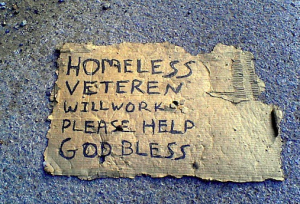 I see him there just down the street. See the ratty jeans that are too small and the jacket that may have fit once but is now too big. See the hat pulled down over his bushy hair and his empty eyes. And the sign—HOMELESS PLEASE GIVE—that is propped against his left leg.
I see him there just down the street. See the ratty jeans that are too small and the jacket that may have fit once but is now too big. See the hat pulled down over his bushy hair and his empty eyes. And the sign—HOMELESS PLEASE GIVE—that is propped against his left leg.
A few who pass offer him quarters and dollar bills. One brings a cup of coffee. Another a candy bar. He takes them with a nod, but no words. One woman offers him both money and a sandwich from the 7-11 down the road. As she walks away, he stares at her backside and smiles.
The patch on his right sleeve is the eagle of the 101st Airborne. Army. A veteran. But then he turns and I see above his left pocket the globe and anchor of the Marine Corps.
I rub my chin. Something’s wrong here.
Another dollar from another woman, which brings another nod and another leer as she walks away. He tips his cap in salute of her appearance. As he does, he exposes the gold watch on his wrist.
I rub my chin again.
Then I begin to understand.
Such sights are more common than we would like to admit—people who pretend to be homeless, penniless, and hopeless but who in fact are none of the above. They spend their days playing to the sympathies of the public and spend their nights in their own homes mocking those good deeds.
And this, I think to myself, is one of those people.
I remain where I am and study his technique. He’s had practice, this man. He knows how to look and act his part, though the gold watch on his wrist and the conflicting patches on his jacket tell me he hasn’t been at this little charade long.
But his silence more than makes up for his lapses. Silence conveys a sense of brokenness, and he has to act broken. The leering at the women, though, is trouble. He’ll have to work on that if he wants to stay in character.
He tips his cap again to another passerby. I notice more this time. His hand is shaking in an almost violent spasm. He’s sniffing, too. Not a big deal in the winter, but this is a warm spring day.
I think I know where all the money he collects out here goes.
Right up his nose.
The cycle of addiction brings out the worst in people. It’s a reality of desperation and wasting away that is only slightly masked by a false and fleeting bliss. It cradles and chokes you at the same time.
He’s rocking back and forth now. I’m not sure if that’s part of the act of it he just needs to move. Or maybe the drugs are wearing off.
He’s decided to use the shakes to his advantage, drawing people to his decay by holding the sign in his trembling hand. It works. Five out of the next twenty people stop to donate. This time there’s much more green than silver.
What should I do with this man? Pity him? Scorn him? Call him unfortunate or lost? Call him worse? I’m not sure. But I know he’s not what he pretends to be, and I know I can’t stand here and watch him any longer.
As he stands between me and my truck, I have to walk past him. Each step brings a little more pity for the addiction choking him and a little less anger for the lie he’s living. I decide this is a test. Give to the poor, Jesus said. Do good. Whatever bad he does with what I give him is his choice, not my consequence.
I reach into my pocket. As I pass, I put the dollar in his hand.
He says, “Thanks, you stupid redneck.”
He shoves my dollar into his pocket before I could snatch it back. I stare at him, fuming.
I spend my ride home enjoying neither sights nor music. I can’t speak, can’t concentrate, can barely think. Anger consumes me.
Not because he took my gift. Not even because he called me a name.
But because he dared to judge me by appearance alone.

March 27, 2014
“Devil” still making the rounds: Week 2
 It’s been a whirlwind couple of weeks since The Devil Walks in Mattingly was officially released March 11. My sincere thanks for continuing to help get the word out.
It’s been a whirlwind couple of weeks since The Devil Walks in Mattingly was officially released March 11. My sincere thanks for continuing to help get the word out.
Here’s some of what’s been going on in the past week:
Interviews
Novel Crossing The Five Books That Changed My Life: Billy Coffey
Litfuse Group Get to know Billy Coffey
katdish.net The Revealing Billy Coffey Multiple Choice Interview
Relz Reviewz Character Spotlight: Meet Billy Coffey’s Jake and Taylor
Maureen Doallas at Writing without Paper Monday Muse: New Interview with Billy Coffey
Faith Village The Story Behind “The Devil Walks in Mattingly”
A Christian Writer’s World THE DEVIL WALKS IN MATTINGLY – Billy Coffey – On Free Book, Plus More (interview and book giveaway)
Reviews
Novel Reviews Billy Coffey’s The Devil Walks in Mattingly Reviewed
Life is a Story The Devil Walks in Mattingly by Billy Coffey
Burton Book Review The Devil Walks in Mattingly by Billy Coffey
By the Book Book Review: The Devil Walks in Mattingly
Just Wondering A book review by Diana Trautwein
Electively Paige Spotlight: The Devil Walks in Mattingly
Regina’s Family Seasons The Devil Walks in Mattingly Book Review
5 Minutes for Books The Devil Walks in Mattingly
JoJo’s Corner Review and Giveaway
Savings in Seconds What’s the local haunt story in your neck of the woods?
Reviews from the Heart The Devil Walks in Mattingly
Goodreads Many great reviews by first time and long time visitors to the town of Mattingly.
Guest spots, Giveaways and other things worth mentioning
BookPage Editor’s Choice for Book of the Day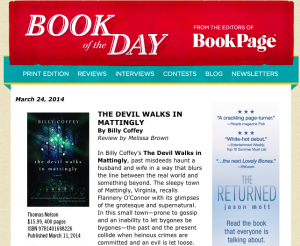

There’s still time to enter The Devil Walks in Mattingly Kindle Fire HDX giveaway.

One winner will receive:
A Kindle Fire HDX
The Devil Walks in Mattingly by Billy Coffey
Enter today by clicking one of the icons below. But hurry, the giveaway ends on April 5th. Winner will be announced April 7th right here on the blog. Watch me give the backstory of the book here.
Don’t miss a moment of the fun; enter today and be sure to stop by back here on April 7th to see if you won.
As promised last week, I’m giving away a signed copy of my book. Just leave me a comment below. I’ll draw an entry at random next Friday, April 4, 2014 and the winner will be notified via email.
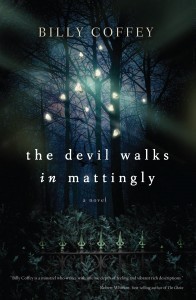
Again, thanks so much for helping me get the word out about the book by sharing links via social media, reviews or just good old fashioned word of mouth. I’ve provided some links below:
Twitter: @billycoffey
Pinterest: http://www.pinterest.com/mattinglyva/
Facebook Author Page: https://www.facebook.com/billycoffeywriter
Join the Launch Team: Devil Walks in Mattingly Launch Team

March 24, 2014
An Invitation to Hell
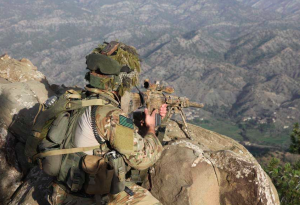
image courtesy of photo bucket.com
For the last three months my buddy Kirk has sequestered himself in a rented cabin deep in the Blue Ridge mountains. As far as I can tell, he took with him only the barest of essentials to complete his stated purpose—a dozen bags of deer jerky, four cases of MREs (that’s Meal, Ready to Eat for you non-military folks), three cases of beer, and two dozen protein bars. That should get him through, he says. If not, he’ll just go hunting.
Get him through for what, you ask? Well, now there’s a story.
Kirk is an old high school classmate and friend. Back then he was awkward and shy and always had his head in a book—three characteristics that guaranteed he’d have a tough time until after his senior year. But he sat in front of me in freshman English and, well, some friendships are born of compatibility and others location.
Even then Kirk wanted to be a writer. A published one. But as both his talent and his confidence were lacking, he always qualified “I want to be an author” with “Probably won’t, though.”
Like a lot of high school friends, Kirk and I lost contact after graduation. But then I ran into him at the mall three months ago.. Well, not him. Not the Kirk I knew. This was New and Improved Kirk, and version 2.0 was quite different.
He had found a cure for all that awkward shyness.
Kirk had become a Ranger in the U.S. Army.
Now that he was out, he was back to pursuing his goal of writing a book. And in the spirit of his down-and-dirty Ranger training, he was locking himself in a cabin in the middle of the wilderness to do it.
And you know what? I bet he will. I can almost guarantee it.
There were a lot of reasons why Kirk wasn’t ready to be a writer in high school. You have to grow some and learn some and fail some and hurt a lot first. But more than that, you have to be trained. Kirk told me he’d had his training now. He was a Ranger.
I’d never considered special forces training and training to be a writer to be one and the same, but he was adamant. They’re exactly alike, he said. Both are a process that tests you, then breaks you down, and then shows you whom you truly are.
But to Kirk, his Ranger training gave him one very big advantage—he’d been taught how to be comfortable in misery. He knew how to embrace the thirst and the hunger. How to endure the cold and the heat. And above all, he knew he was being readied for war and that war was hell, which is why his drill instructors trained him to, in his words, “Get the damn job done. Regardless.”
I think he’s onto something.
Because you can (and should) read all the books you can about the craft of writing. You can learn about plot and character and point of view, learn to kill your darling adverbs and adjectives, and speak in present instead passive voice. But until you learn to be comfortable in misery, you will not succeed. Ever.
There are times when sitting down to write is an invitation to pure bliss, when the words leap from your fingers virgin and perfect and you know without doubt they come from the very best part of you. Enjoy those times. They will be few.
Because for the most part, it’s just the opposite. The writing life is not bliss. It’s roaming through the desert of one submission after another, searching for whatever scrap of food or drip of water you can beg, borrow and steal in order to stay alive. It’s enduring the cold of having nothing to say and the heat of knowing you must write anyway.
And above all, writing is war.
It is a war fought not against agents and publishers, but against yourself. It is a war in which the enemy isn’t acceptance, it’s surrender. And yes, it is hell. No doubt about it. But you know what? A writer, a real one, wouldn’t have it any other way.
I haven’t seen Kirk since. For all I know, he’s still up in the mountains writing his book. I like to think he is. I like to think he’s pounding away at those keys and fighting his war.
That he’s getting the damn job done. Regardless.
I like to think that’s what you’re doing, too.

March 20, 2014
Win a Kindle HDX in “The Devil Walks in Mattingly” Giveaway!

One of the best parts about a book launch is that I get to participate in giving away free stuff.
For one, my friend Katdish is giving away a copy of The Devil Walks in Mattingly today signed by yours truly.
She also interviewed me about a bunch of stuff that has absolutely nothing to do with the book. Or writing for that matter.
But there’s more…
I’m celebrating my new book, The Devil Walks in Mattingly, with a Kindle Fire HDX giveaway.

One winner will receive:
A Kindle Fire HDX
The Devil Walks in Mattingly by Billy Coffey
Enter today by clicking one of the icons below. But hurry, the giveaway ends on April 5th. Winner will be announced April 7th right here on the blog. Watch me give the backstory of the book here.
Don’t miss a moment of the fun; enter today and be sure to stop by back here on April 7th to see if you won.






